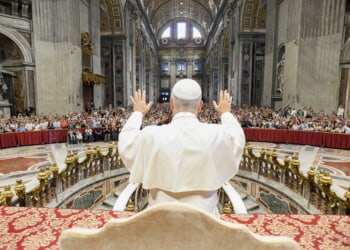ACI Africa, Sep 17, 2025 /
14:10 pm
Nigeria is “sinking in many fronts,” the president of the Catholic Bishops’ Conference of Nigeria (CBCN) said at a recent meeting, lamenting that in addition to economic hardships Nigerians are grappling with, many communities have been thrown into perpetual mourning due to unending insecurity.
In his address at the ongoing interactive session between CBCN and the “prominent lay faithful” of Calabar ecclesiastical province, Archbishop Lucius Iwejuru Ugorji said many Nigerians have been killed, and those who fled are languishing in camps where they are exposed to extreme weather conditions, often without food and water.
Acknowledging “notable progress here and there” in the country where persecution against Christians is said to be the highest globally, the archbishop of Nigeria’s Archdiocese of Owerri said: “We also lament that our beloved country Nigeria is sinking in many fronts.”
“Insecurity continues to haunt us,” he said at the nine-day event that started on Sept. 11. “Many towns and villages across the nation have become communities of fear, flight, and funerals.”
“Our fellow citizens are being daily kidnapped, extorted, dehumanized, killed, or forced to flee their ancestral homes, abandoning their sources of livelihood to seek refuge in makeshift camps, exposed to extreme weather conditions, often without food and water,” the CBCN president said.
The CBCN interaction with the faithful of Calabar ecclesiastical province is being held at the Diocesan Retreat and Youth Centre in Akwa Ibom state.
Over the years, it has been CBCN’s custom to have an interactive session with the faithful of the ecclesiastical province wherever the bishops gather for their plenary assembly.
The goal, Ugorji said in a statement shared with ACI Africa, CNA’s news partner in Africa, is for the bishops in Nigeria to know the people they serve “closely, to share their concerns and to acquaint them with our own concerns as shepherds of God’s flock in Nigeria.”
In his address, the archbishop expressed concern about the growing poverty in the West African nation, where he said unemployment continues to increase.
“We are deeply troubled that our fellow Nigerians have continued to groan under economic hardship and seem doomed to a life of destitution and frustration,” he said.
“We are also worried about the high rate of youth unemployment, which is driving some of our young men and women to crimes and others to migrate in search of greener pastures abroad, leading to brain drain and continuous loss of some of our best and brightest minds.”
He further lamented that Nigeria’s health sector is on its knees, noting that the death of the immediate former President Muhammadu Buhari in London exposed the gaps in the country’s health care.
Buhari’s death on July 13 away from home, Ugorji said, “raised fresh questions about our crumbling health institutions, the mass exodus of our medical professionals, the billions of naira [Nigeria’s monetary unit] spent abroad by our leaders on medical tourism, while millions of Nigerians languish at home from treatable ailments due to the miserable state of our hospitals.”
Also worrying is Nigeria’s educational institutions that the CBCN president said are facing significant challenges, including inadequate funding, “decaying infrastructure” and diminishing number of qualified teachers.
The result, he said, is a steady decline in the quality of education.
Underpinning the challenges, the archbishop said, is corruption, which he described as moral rottenness that is “spreading unchecked like a deadly cancer to all sectors of our national life, silently eating up the soul of the nation.”
(Story continues below)
Subscribe to our daily newsletter
The official of CBCN expressed concern that while Nigerians face serious existential threats, many politicians at the national and sub-national levels seem more preoccupied with the country’s 2027 general elections and less concerned with fulfilling their campaign promises to the electorate.
The opposition on the other hand, he said, “is busy building coalitions to clench power in 2027.”
“If this state of affairs continues, the nation will totally collapse,” Ugorji warned, calling for “a drastic change” to allow the common good to drive Nigeria’s economic, social, and cultural life.
“Who is to effect the transformation of our nation?” he posed. “We strongly believe that the lay faithful have a major and decisive role to play in this matter.”
Acknowledging that change is not easy to come about in Nigeria’s political system, the archbishop said: “If we expect much from the laity in the area of national transformation, much has to be given to them in terms of political education.”
He underlined the need for political education that encourages honest and God-fearing lay faithful to join political parties and persuade those with the talent for leadership to seek political office as a way of advancing the common good in accordance with the social teaching of the Church.
This story was first published by ACI Africa, CNA’s news partner in Africa, and has been adapted by CNA.

















